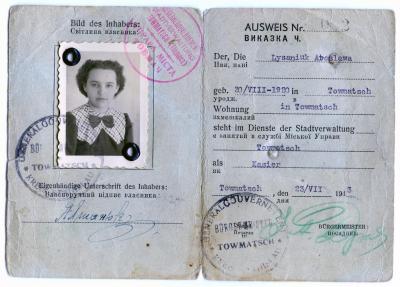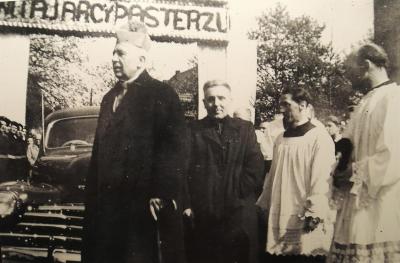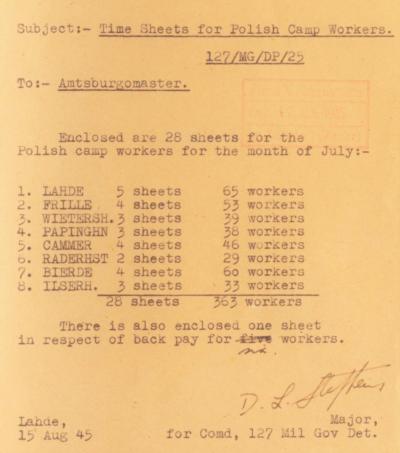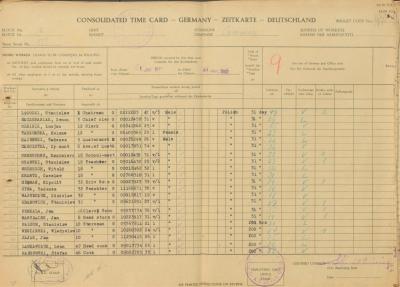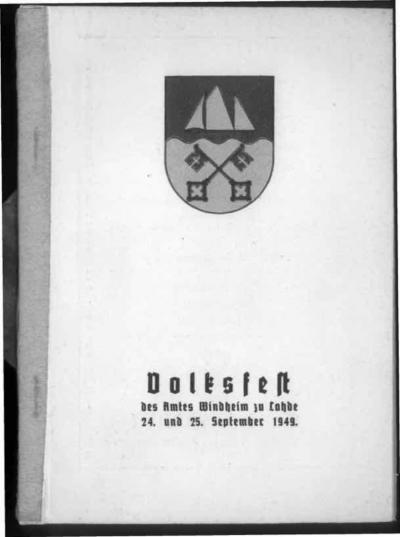The “Polish camp” in Lahde/Weser
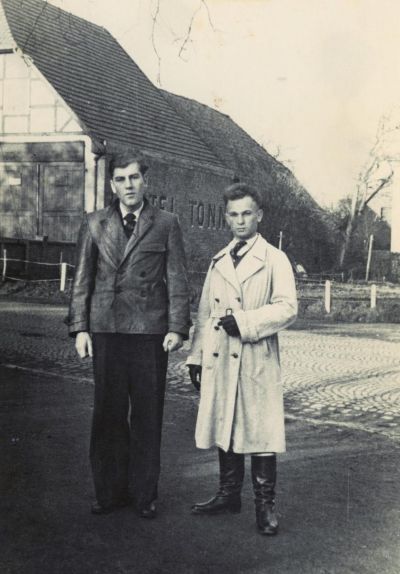
The setting up of the Displaced Persons Assembly Centre in Lahde/Weser
The detachments of the military government were faced with the difficult task of supervising the German civil administration authorities, controlling their work and, amongst others, solving the problems of many thousands of displaced persons. To do this, Detachment 127 set up a Displaced Persons Assembly Centre (DPAC) on the northern edge of a small town called Lahde on the River Weser on 9th April 1945. This was the meeting point for thousands of freed prisoners of war, forced labourers and prisoners who had fled from the war zone in the area of Hanover. At first the existing camps in the area around Lahde were used to set up living quarters. These included the former Hannover Gestapo “work education camp”, the “Eastern workers camp” (where Russian forced labourers had been accommodated), and other barracks in the immediate neighbourhood, above all near the power station building site.
On 8th April 1945 sections of the third British infantry division were stationed along the Weser to keep order. The barracks camp quickly became overcrowded and by mid-April 1945 most parts of Lahde had been cleared to cater for the DPs. These measures were also taken in seven other places in the area. The upshot was that the local population tried to find emergency quarters in the neighbouring parishes. The newly erected DP camps in Meerbeck, Steinhude and Loccum were at first supervised by Detachment 127 in Lahde. Polish displaced persons made up the majority of the inhabitants in the Lahde DPAC. It was, and still is, known by many locals in the area as the “Polish camp”.
The UNRRA takes over responsibility for administrating the camp
After the Germans had capitulated teams from the “United Nations Relief and Rehabilitation Administration” (UNRRA) took over responsibility for administrating the DPACs. The activities of the UNRRA Teams in the PACs were supervised by the detachments.
In the following few months it became clear that UNRRA had only a limited capacity to take over all the PACs in the British occupied zone, as originally planned. For these and other reasons, a few foreign camps remained in the British occupied zone (one of these was the DPAC Lahde), under the control of special “relief” detachments from the military government.
Criminal acts in relationship to the DPACs
In 1945 and1946 there were a growing number of revenge crimes and attacks by DPs of varying nationalities against the local German inhabitants. The Weser region was also shaken by a growing quantity of murders, robberies and other brutal crimes in the first few years after the war. There is also evidence that Germans and DPs committed robberies together with Germans. The booty was often hidden in apartments belonging to German accomplices to prevent them being discovered in the DPAC. These offences reached a peak in the course of 1945 and began to decline in 1946.
Partly for foreign policy reasons, the British occupied forces took into account the fact that Polish DPs had fought alongside allied ground troops and air forces during the Second World War. After the war some of these troops remained in the service of the British forces. Freshly founded civilian units like the Civil Mixed Labour Organisation (CMLO) and the Mixed Service Organisation (MSO) were also elements in the British Army of The Rhine (BAOR). Polish displaced persons were given jobs here too.
The camp structure and organisation in the Lahde DPAC. Repatriation problems
On 9th May 1945 UNRRA Team 65 took over responsibility for administrating the DPAC in Lahde. According to British figures there were about 20,000 displaced persons here at the end of May 1945. According to German figures between 12,000 and 17,000 homeless foreigners were living in the Lahde DPAC until it was closed down. The leading posts in the UNRRA camp (i.e. the director and his deputy), were first held by British citizens. From around 1947 the post of the UNRRA director was held by a Polish national.
From 1945 the proportion of Polish displaced persons became increasingly dominant in the Lahde DPAC. Each DP camp had its own individual structure and its Mayor, community council and camp police. Weddings were held in the camps and children were born here. Displaced persons who died were laid to rest in local cemeteries. As far as running the camps was concerned, DP’s were also given the opportunity to work in the administrative quarters, the supply depot, in the education and health services, as craftsmen and unskilled workers. They were paid in German currency by the Lahde administration authorities under British control.
Lessons in Polish schools began in Cammer camp as early as May 1945. In July Polish schools were opened in the camps at Bierde, Frille, Ilserheide, Lahde, Raderhorst and Wietersheim. Polish teachers were on the UNRRA payroll.
The medical care of displaced persons – including dental care – was ensured by setting up DP hospitals in Lahde, Frille and Bad Hopfenberg. The Lahde Protestant church was also used by Catholic priests from the DP church community. Following an agreement between the Western Allies and Russia, repatriation of Russian DPs from the western occupied zones began in May 1945. This was for the most part completed by the following September.
But allied plans to repatriate Polish DPs immediately failed to materialise. Infrastructures in Poland had been severely damaged by the invading German forces in 1939 and the battles during their retreat at the end of the war. The shift of Polish borders westwards also meant that original parts of Poland ceased to exist and some Polish DPs were made stateless persons. The Russian occupation of Poland led to the introduction of a Communist regime. Such a perspective meant that the mass of Polish – and also Baltic – misplaced persons refused to be repatriated, and preferred to be sent to other countries abroad. The headquarters in the British occupied zone accepted their decisions, the upshot of which was that the management of the DPACs continued for some time longer.
By summer 1945 it could be foreseen that that the supply situation for displaced persons and the German population would dramatically deteriorate from October onwards. So, in June 1945, the British decided to release German prisoners of war in order to ensure that enough people were available to work in the coming harvest; and also to restore coalmining activities in the Ruhrgebiet. For this reason DP camps were also closed in the Ruhrgebiet and displaced persons distributed amongst other camps in Westphalia.
In August 1945 a typhus epidemic broke out in the district of Lahde, that was successfully wiped out a few weeks later. This led, amongst others, to stricter standards of hygiene in the Lahde DPAC. There was also an acute shortage of fuel in the camps administered by the Lahde DPAC during the harsh winter of 1945/1946. As a result, buildings and courtyards were dismantled in order to get wood from furniture, staircases and rafters for heating and cooking purposes. Ad hoc fireplaces and electric cookers led to some of the courtyards in the camps being burnt down to the foundations.
In August 1946 UNRRA was already responsible for 127 DP camps in the British occupied zone, and the military government was intending to hand over the last DP camps to UNRRA by the end of the year. But things developed in the opposite direction. After UNRRA Area Teams had been set up to supervise a number of foreigners camps, formal responsibility for the DPACs was first handed over to the military government. UNRRAA was then dissolved at the end of June 1947 and it was decided to hand over its responsibilities to the International Refugee Organization (IRO) in July 1947. As a result the USA and the countries in the Commonwealth of Nations, both of which were coveted destinations for displaced persons, loosened their immigration restrictions for DPs who were unwilling or unable to be repatriated. Some of these went their own way within the Federal Republic of Germany. The sinking number of people living in DPACs led to an easing of the situation.
The closure of the Päpinghausen camp in spring 1948 marked the start of the dismantling of the Lahde DPAC. This process came to an end in September 1949 when the camp in Lahde was closed. The local population returned to their towns and villages and reconstruction in Germany rapidly began.
Hermann Kleinebenne, March 2016
Sources:
The National Archives, London, Foreign Office documents, the War Office
The local authority archive in Petershagen, documents on the foreigners’ camp in Lahde held in the Lahde district office.
The Kevin Irla archive
The Russell Panczenko archive
The Anna Young archive
